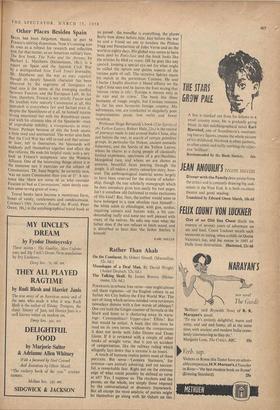Other Places Besides Spain
SPAIN has been forgotten, thanks in part to Franco's retiring disposition. Now it's coming into Its own as a subject for research and reflection and, for that matter, as an American military base. The first book, The Yoke and the Arrows, by Herbert L. Matthews (Heinemann, 18s.), is a report on Spain and the Spanish Civil War by a distinguished New York Times journalist. Mr. Matthews sees the war as muy espaflol. though its deeply Spanish character has been obscured by the eagerness of foreigners to read into it the terms of the emerging conflict between Fascism and the European Left. In his view, therefore, Franco is not strictly Fascist and the loyalists were scarcely Communist at all. His approach is everyWhere fair and factual even if, despite the Spanishness of it all, he himself retains strong emotional ties with the Republican cause, and with his ultimate idea of the Spaniards—men of improbable nobility, a riwrgintento in every breast. Perhaps because of this the book seems a little tired and sentimental. The writer also feels that the Civil War has still to end and that sooner or later, left to themselves, the Spaniards will suddenly pull themselves together and effect the due reforms. He ends his helpful study with a wry look at Franco's acceptance into the Western Alliance. One of the interesting things about it is the immense tact it exercises on the subject of Communism. 'Dr. Juan Negrfn,' he earnestly says, 'was no more Communist than you or I!' A sell: tence like `there are some of us who consider Fascism as bad as Communism,' must stirely con- tain some saving grain of irony.
Travel books have become a monstrous form, boxes of vanity, carelessness and condescension. Cocteau's (My Journey Round the World, Peter Owen, 18s.) is the autobiographical travel book at its purest: the traveller is everything, the places' fairly bow down before him. Just before the war he and a friend set out to emulate the Phileas Fogg and Passepartout of Jules Verne and do the world in eighty days. His"global way seems to have been paid by Paris-Soir and the book looks like the articles he filed en route. Off he goes like any sputnik, keeping a special eye out for what might be called the opium and geisha aspects of the various ports of call. The secretive Sphinx meets his match in the portentous Cocteau. He and Charlie Chaplin discover a blood affinity on the high China seas and he leaves the East saying that 'intense virtue is rife'; 'Europe is intense only in its vice and its crime.' The book has these moments of rough insight, but Cocteau remains by far his own favourite foreign country. His adventures, too, are conducted in singularly poor impressionistic prose, few verbs and fewer vertebrae. Professor Hugo Bernatzik's book (The Spirits of the Yellow Leaves, Robert Hale, 21s.) is the record of journeys made in and around Indio-China, also just before the war, in search of certain primitive groups. In particular the Moken, ancient nomadic fishermen, and the Spirits of the Yellow Leaves, whom he claims as a dying people of classically limited experience, specimens of, a pre-Neolithic Mongoloid race, and whom we are shown as anxious, beautiful faces peering through the jungle. It all makes a pretty colourless story, how- ever. The anthropological material seems largely to have been reserved for the arcana of scholar- ship, though the one scholarly monograph which he does introduce gives him easily his best pages. Isn't it somehow old-fashioned to make exclusions of this kind? But, then, the author would seem to have belonged to a now obsolete race himself— the white sahib as ethnologist, with gun, sunhat, inquiring camera and buxom wife, a bit con- descending really and none too well pleased with many of the natives. He asks one man what the father does if the son refuses to fetch wood, and is disturbed to hear that 'the father fetches it himself.'
KARL MILLER










































 Previous page
Previous page